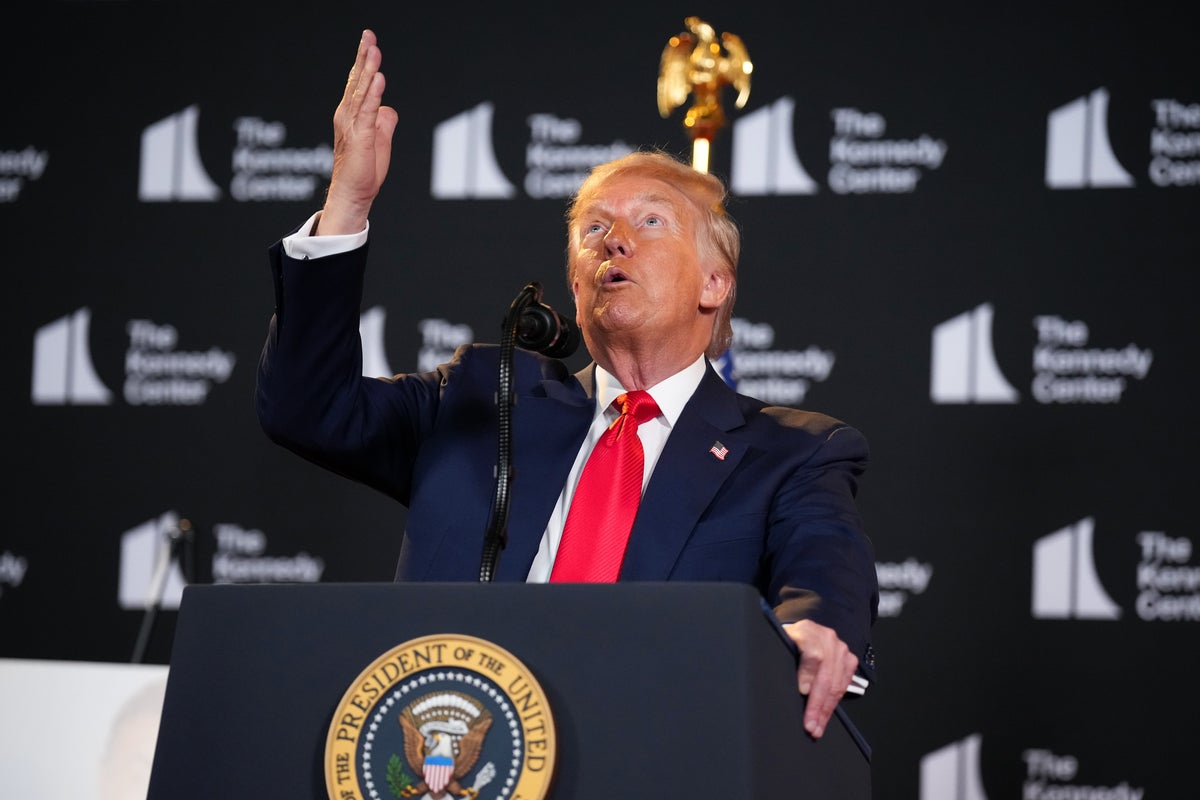
In the eight months since President Donald Trump took over the Kennedy Center, ticket sales have plummeted by nearly 50 percent, according to a new report.
Just weeks after reclaiming the White House, Trump fired members of the Kennedy Center’s board and picked replacements while installing himself as chair.
Since then, tens of thousands of seats have been left vacant at the Kennedy Center’s three largest performance venues, according to an analysis of ticket sales by the Washington Post.
From September 3 through October 19 at the Opera House, the Concert Hall and the Eisenhower Theater, 43 percent of tickets remained unsold for the typical production, the Post found.
That figure marks a significant drop from sales in the same time period over the last two years. In 2024, 93 percent were sold between September and October; in 2023, during that time frame, 80 percent were sold, the analysis found.
The Independent has contacted the Kennedy Center for comment.
Sold tickets also likely include tickets that were given away for free to Kennedy Center staff or members of the media.
Consumers spent less money at the center during any other year since 2018, with the exception of 2020, when it was closed for months during the Covid-19 pandemic, the Post found.
Empty seats may now be a staple of Kennedy Center performances — but in recent years, empty seats were somewhat of a rarity.
In the same September-October period last year, an average of only 7 percent of seats went unsold on the day of the performance. That’s compared to 20 percent that went unsold in 2023 and just 6 percent in 2022.
Even in 2021, when the institution was bouncing back from being shuttered during the pandemic, fewer seats were available. That year, 34 percent of seats went unsold compared to 43 percent this year.
“Given the unprecedented takeover of a nonpartisan arts institution combined with the inexperience and rhetoric of the new management, I expected a decline in sales; however, it is truly shocking to see that these actions have been worse for business at the Kennedy Center than the aftermath of a global pandemic,” a former staff member told the outlet. “These numbers are likely more dire than they appear, as they don’t account for canceled productions or shows moved into smaller theaters due to weak ticket sales.”
Michael Kaiser, who served as the Kennedy Center president from 2001 through 2014, warned that there could also be impacts on fundraising efforts.
“Depressed ticket sales not only cause a shortfall in revenue; they also bode unfavorably for future fundraising revenue,” Kaiser told the Post.
“The vast majority of donors are ticket buyers who are anxious to enhance their relationships with the organization by making contributions in addition to paying for their tickets. We had 40,000 generous individual donors by the time I left the Center in 2014. Funding from these individuals formed the foundation for all we accomplished.”
On Friday, Richard Grenell, the president of the Kennedy Center, announced “a record-breaking 30 days of donor and sponsor support” for the venue, raising $58 million, he said in a social media post Friday, hours after the Post’s analysis was published.
He noted the center has “a balanced budget for the *first* time in decades” and credited Trump as “being a visionary for how struggling Arts Institutions across the U.S. can survive.”
“Every show we have had since February when President Trump took over the leadership of the Kennedy Center has either made money or broke even (a huge change to what was happening) – we haven’t lost money on any show thanks to patrons and show donors,” Grenell said. “The Kennedy Center is showing Arts Institutions how to thrive.”
